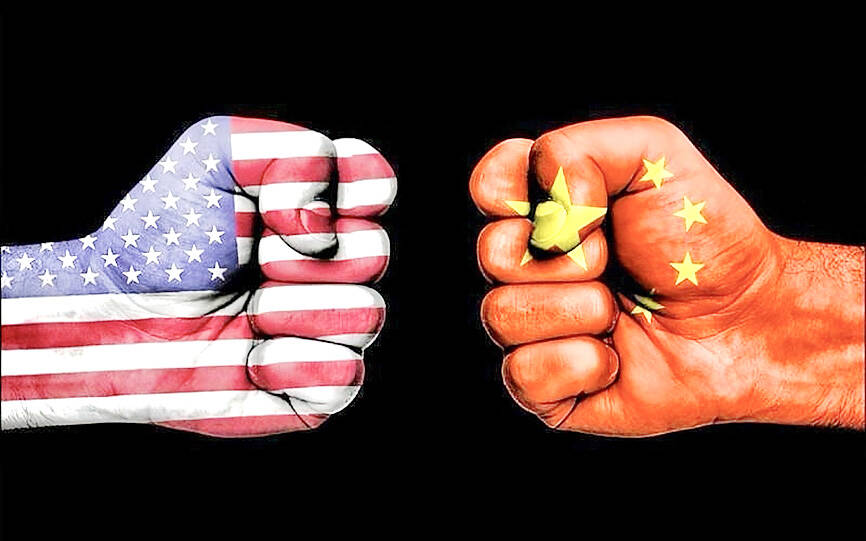Taiwan and other Asian countries could face steep US tariffs on electronics and semiconductors, as Washington seeks to pressure regional manufacturers into investing in the US and build its own domestic supply chains, market research firm Digitimes Inc (大椽股份) said yesterday.
As part of its broader strategy to boost its domestic manufacturing, the US is expected to use tariffs as leverage to bring Asian countries — including Taiwan — to the negotiating table and encourage their electronics suppliers to establish operations in the US, Digitimes vice president Eric Huang (黃逸平) said in a statement.
Washington’s focus extends beyond semiconductor makers in Taiwan and across Asia — including Japan, South Korea and Southeast Asian nations with electronics hubs — to the broader electronics supply chain, particularly key components such as flat panels, Huang said.

Photo: Bloomberg
Taiwan must prepare for potential US tariffs down the road, Huang said.
“We need to have semiconductors, we need to have chips and we need to have flat panels ... we need to have these things made in America. We can’t be reliant on Southeast Asia for all of the things that operate for us,” US Secretary of Commerce Howard Lutnick told ABC News’ This Week coanchor Jonathan Karl on Sunday.
In addition, US President Donald Trump on his Truth Social platform said that his administration would launch a national security tariff investigation focused on semiconductors and the broader electronics supply chain.
“We will not be held hostage by other countries, especially hostile trading nations like China,” he said.
Under growing pressure from Washington, the global electronics market is likely to fragment into three major blocs: the US, China and a third market comprising countries outside both, Huang said.
Amid escalating trade tensions between Washington and Beijing, electronics suppliers are expected to shift production either to the US or to countries with relatively low tariff exposure, while China would focus on developing its own electronic devices to serve the domestic market, he said.
In addition, as electronics makers ramp up investments in the US, they are likely to accelerate expansion in Mexico as well, drawn by tariff-free incentives under the United States-Mexico-Canada Agreement, he added.
In contrast, China is likely to continue encouraging technology suppliers to localize production within its borders, especially as it faces high tariffs and export controls from the US, he said, adding that foreign firms hoping to access the Chinese market would likely need to source components and carry out assembly domestically, he added.
China is expected to step up efforts to develop its own semiconductor ecosystem — particularly in artificial intelligence, electric vehicle applications and high-bandwidth memory chips — as part of a broader push to “de-Americanize” its supply chain and circumvent US restrictions, Huang said.
Conversely, the US would pursue its own strategy of desinicization to reduce reliance on Chinese technologies, he said.

STEEP DECLINE: Yesterday’s drop was the third-steepest in its history, the steepest being Monday’s drop in the wake of the tariff announcement on Wednesday last week Taiwanese stocks continued their heavy sell-off yesterday, as concerns over US tariffs and unwinding of leveraged bets weighed on the market. The benchmark TAIEX plunged 1,068.19 points, or 5.79 percent, to 17,391.76, notching the biggest drop among Asian peers as it hit a 15-month low. The decline came even after the government on late Tuesday authorized the NT$500 billion (US$15.2 billion) National Stabilization Fund (國安基金) to step in to buoy the market amid investors’ worries over tariffs imposed by US President Donald Trump. Yesterday’s decline was the third-steepest in its history, trailing only the declines of 2,065.87 points on Monday and

TAKING STOCK: A Taiwanese cookware firm in Vietnam urged customers to assess inventory or place orders early so shipments can reach the US while tariffs are paused Taiwanese businesses in Vietnam are exploring alternatives after the White House imposed a 46 percent import duty on Vietnamese goods, following US President Donald Trump’s announcement of “reciprocal” tariffs on the US’ trading partners. Lo Shih-liang (羅世良), chairman of Brico Industry Co (裕茂工業), a Taiwanese company that manufactures cast iron cookware and stove components in Vietnam, said that more than 40 percent of his business was tied to the US market, describing the constant US policy shifts as an emotional roller coaster. “I work during the day and stay up all night watching the news. I’ve been following US news until 3am

Six years ago, LVMH’s billionaire CEO Bernard Arnault and US President Donald Trump cut the blue ribbon on a factory in rural Texas that would make designer handbags for Louis Vuitton, one of the world’s best-known luxury brands. However, since the high-profile opening, the factory has faced a host of problems limiting production, 11 former Louis Vuitton employees said. The site has consistently ranked among the worst-performing for Louis Vuitton globally, “significantly” underperforming other facilities, said three former Louis Vuitton workers and a senior industry source, who cited internal rankings shared with staff. The plant’s problems — which have not

TARIFF CONCERNS: The chipmaker cited global uncertainty from US tariffs and a weakening economic outlook, but said its Singapore expansion remains on track Vanguard International Semiconductor Corp (世界先進), a foundry service provider specializing in producing power management and display driver chips, yesterday withdrew its full-year revenue projection of moderate growth for this year, as escalating US tariff tensions raised uncertainty and concern about a potential economic recession. The Hsinchu-based chipmaker in February said revenues this year would grow mildly from last year based on improving supply chain inventory levels and market demand. At the time, it also anticipated gradual quarter revenue growth. However, the US’ sweeping tariff policy has upended the industry’s supply chains and weakened economic prospects for the world economy, it said. “Now